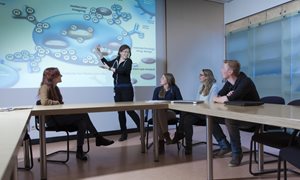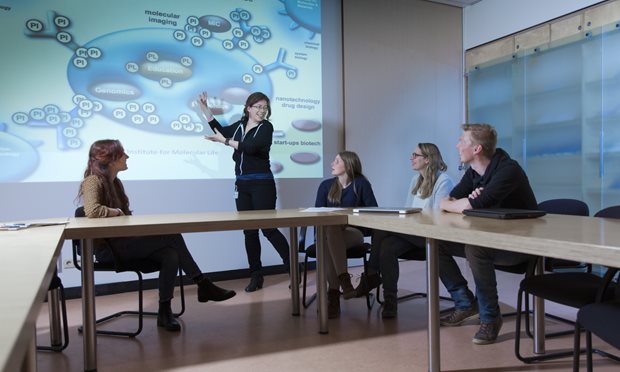

Our education
We contribute to the curriculum of Medicine and Biomedical Sciences, which allows general practitioners and biomedical scientists to graduate with a thorough knowledge of infectious disease prevention and a rational antibiotics policy. read moreOur education
Our mission is to ensure that general practitioners and biomedical scientists graduate with a thorough knowledge of infectious disease prevention and a rational antibiotics policy. That is why these subjects form an important part of the standard curriculum for these students.
We also offer Dutch and international students the opportunity to participate in a minor where they can specialize in infectious diseases if they have a particular interest in the field. These programs are available in the following subjects: Opportunistic infections, the immune response to infections of the host, and global health. The courses are open for exchange students to follow, see the tabs below for more information about these courses.

Our degree programs
These explicitly transfer our expertise in the field of infectious diseases to new, young medical professionals during their specialist degree programs.
read moreOur degree programs
At the Radboudumc Community for Infectious Diseases, various professionals collaborate in a multidisciplinary manner. They explicitly transfer their expertise in the field of infectious diseases to new, young medical professionals during their specialist degree programs. Infectious diseases form an important part of the degree programs for:
- medical microbiologists
- internist-infectious disease specialists (= differentiation year 5/6)
- pediatric infectious disease specialists/immunologists
- hospital pharmacists, with specific differentiation year in Infectious Diseases.
- nursing specialists in infectious diseases
Opportunities for international students
We have the ambition to implement international collaboration and shared education possibilities in education of our bachelor programmes Medicine and Biomedical Sciences. read moreOpportunities for international students
The field of medical sciences is rapidly expanding and country borders are becoming less of a barrier for achieving great science. Health problems need to be solved on a global scale for more impact on healthcare. Internationalization is happening everywhere, also in education. Therefore, we have the ambition to implement international collaboration and shared education possibilities in education of our bachelor programmes Medicine and Biomedical Sciences.
In a joint collaboration of the RCI coordinators of education, we decided to open our bachelor minor tracks (semester of September to January) for 3rd or 4th year international students in de field of Medical Sciences. Only a limited amount of placements are reserved to ensure the best quality in education.
Information about the specific courses can be found in the tab ‘Our bachelor minor tracks’.
For questions about the possibility of following these minor tracks, please contact Koen van Aerde.
Bachelor - Master - Postgraduate
Our master courses
-
Description
Microorganisms are a leading cause of disease. In this course, we will discuss different classes of microbes of medical importance. As several courses within the Microbiology MSc program focus on the biology of bacteria, we will discuss viruses, fungi and parasitic protozoa. Focusing on important representatives in each class, the biology, pathogenesis, diagnosis, treatment, and prospects for vaccine development will be presented.
The course consists of lectures, interactive lectures, self-study assignments, and group assignments. Assignments will be posted on BrightSpace.Objectives
At the end of the course, the student
- has obtained insights into the field of Medical Microbiology, including diagnostics, antibiotic resistance and antibiotic stewardship, and infection control.
- is able to describe important characteristics of different classes of microbes that cause human disease (fungi, viruses, and parasites).
- understands important concepts in transmission, pathogenesis, vaccine development, therapy and drug resistance.
- can describe the life cycles of major classes of viruses.
Relation
This part is mandatory for students of the MSc track “Microbiology” within the MSc program Medical biology. There is room to place additional students from other programs (up to a total of 30 students).
- Coordinator: Ronald van Rij (dept. Medical Microbiology,Radboudumc), rci@radboudumc.nl
- Vice-coordinator: Pascal Miesen (dept. Medical Microbiology, Radboudumc), rci@radboudumc.nl
-
Description
This course provides students with two distinct topics in the area of Infectious diseases and global health, with each topic being taught for four days. The first topic is ‘HTA for Universal Health Coverage’, which is a central theme in present global health debates. The goal of Universal Health Coverage is to ensure that all people obtain the health services they need without suffering financial hardship when paying for them. The course concentrates on the role of HTA in this, and includes an assignment to assess the challenges of a specific country to achieve UHC. The second topic is on ‘Infectious disease surveillance, and outbreak investigation and control’. The course explains the do’s and don’ts of detection of infectious disease outbreaks and evidence-based methods of outbreak control. The course includes an assignment related to an actual infectious disease outbreak, in which students need to develop an evidence-based outbreak control plan.
Objectives
After completion of the course, students are able to:
For ‘HTA for Universal Health Coverage’- define (knowledge) UHC
- explain (comprehension) the basic concept of UHC
- apply / perform (application) UHC to a specific country context
- distinguish (analysis) HTA - the choices that countries need to make on their path to UHC
- evaluate (evaluation) HTA - the choices that a country has made on the path to UHC
For ‘Infectious disease surveillance, and outbreak investigation and control’
- define (knowledge) an infectious outbreak
- explain (comprehension) the essentials of outbreak detection
- apply / perform (application) the development of an outbreak control plan
- distinguish (analysis) between pros and cons of different options in outbreak control
- evaluate (evaluation) the effect of different outbreak control measures
- Coordinator: prof. dr. R.M.P.M. Baltussen, rci@radboudumc.nl
- Vice-coordinator: dr. A. Tostmann, rci@radboudumc.nl
Our postgraduate courses
-
The Center of Expertise in Mycology of Radboud University Medical Center / Canisius Wilhelmina Hospital together with the Foundation Atlas of Clinical Fungi will organize a hands-on course on fungal identification.
This course is specially designed for lab technicians, but also other workers in lab diagnostics may wish to attend. Background of fungal classification will be explained in detail, with both theoretical and practical sessions. The relevant fungi will be shown, and brief introductions will be provided into other diagnostic techniques, such as PCR and Maldi-tof. A special session will be devoted to susceptibility testing. The course will be didactic in such a way that no special mycological background is required. The one-week course will terminate with an examination and certificate. Lectures will be given by Hein van der Lee, Sybren de Hoog and Paul Verweij.
Read more about the International Course Identification of Medical Fungi
-
How to improve antibiotic use: a practical introduction to the development and implementation of Antimicrobial Stewardship Programs
Our goal is to guide professionals and policy makers through the process of developing and implementing a successful Antimicrobial Stewardship Program in their hospital, healthcare system, region or even country. We achieve to do so by preparing you through pre-course online courses and project assignments, by teaching you through a 5-day course and helping you to elaborate your project. After the masterclass a dedicated coach will assist you with the evaluation and refinement of the project.
Read more about Dutch Antimicrobial Stewardship
